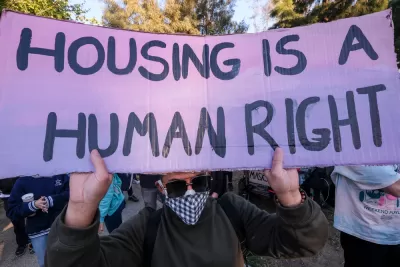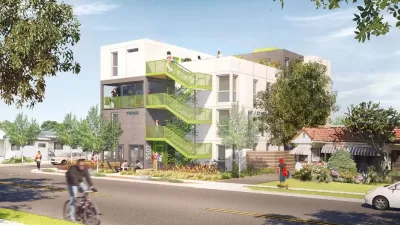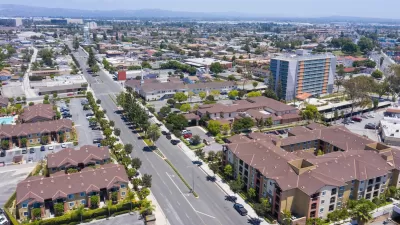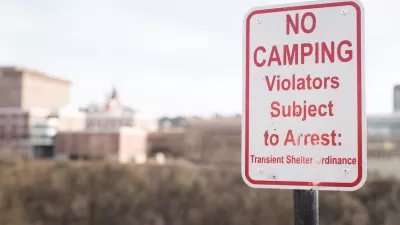Two new studies shed light on what people experiencing homelessness actually need by using a shocking new tactic: asking them.

It may sound simple, but it’s sadly all too rare: if you want to know what unhoused people need, ask the unhoused people themselves. As Rob Eshman reminds the reader in a piece for Los Angeles-based Zócalo Public Square, “until recently, you’d be hard-pressed to find studies asking the people actually experiencing homelessness what they think should be done about the crisis.”
Eshman highlights two recent surveys that finally address this issue by directly communicating with unsheltered and unhoused people. “The two new studies seek to bridge the gap between the well-intentioned plans and what unhoused people themselves say they actually need,” Eshman writes. Unsurprisingly, the top need people cite in both surveys is simply housing.
That seems like a no-brainer, but in fact is big news that should combat pervasive myths that suggest homeless people prefer to live in encampments, that it’s preferable to wait for more permanent housing, or that even if taxpayers funded shelters, homeless people wouldn’t agree to go there.
A RAND Corporation survey found that 90 percent of respondents wanted to find housing, but faced bureaucratic and logistical obstacles. Another study from the A-Mark Foundation and UCLA’s Luskin School of Public Affairs yielded similar results, with 92 percent of respondents in L.A.’s notorious Skid Row saying shelter was their first priority, even as millions of federal dollars directed at fighting homelessness went unspent by the city.
The surveys also shed light on what type of housing works and doesn’t work. For example, “In two focus groups that were part of the A-Mark Foundation survey, women said they avoided shelters that broke up families,” a common practice in many shelters. “Lack of security at shelters and concern over sexual violence were also named as top concerns. Men said curfews that made shelters feel like prison and prohibitions against dogs kept them away.”
The results illuminate the stark need for more temporary and long-term shelter and housing options that are responsive to the real needs of the people they serve.
FULL STORY: What Do Unhoused People Want Most? Ask Them

Planetizen Federal Action Tracker
A weekly monitor of how Trump’s orders and actions are impacting planners and planning in America.

Maui's Vacation Rental Debate Turns Ugly
Verbal attacks, misinformation campaigns and fistfights plague a high-stakes debate to convert thousands of vacation rentals into long-term housing.

San Francisco Suspends Traffic Calming Amidst Record Deaths
Citing “a challenging fiscal landscape,” the city will cease the program on the heels of 42 traffic deaths, including 24 pedestrians.

Defunct Pittsburgh Power Plant to Become Residential Tower
A decommissioned steam heat plant will be redeveloped into almost 100 affordable housing units.

Trump Prompts Restructuring of Transportation Research Board in “Unprecedented Overreach”
The TRB has eliminated more than half of its committees including those focused on climate, equity, and cities.

Amtrak Rolls Out New Orleans to Alabama “Mardi Gras” Train
The new service will operate morning and evening departures between Mobile and New Orleans.
Urban Design for Planners 1: Software Tools
This six-course series explores essential urban design concepts using open source software and equips planners with the tools they need to participate fully in the urban design process.
Planning for Universal Design
Learn the tools for implementing Universal Design in planning regulations.
Heyer Gruel & Associates PA
JM Goldson LLC
Custer County Colorado
City of Camden Redevelopment Agency
City of Astoria
Transportation Research & Education Center (TREC) at Portland State University
Jefferson Parish Government
Camden Redevelopment Agency
City of Claremont





























